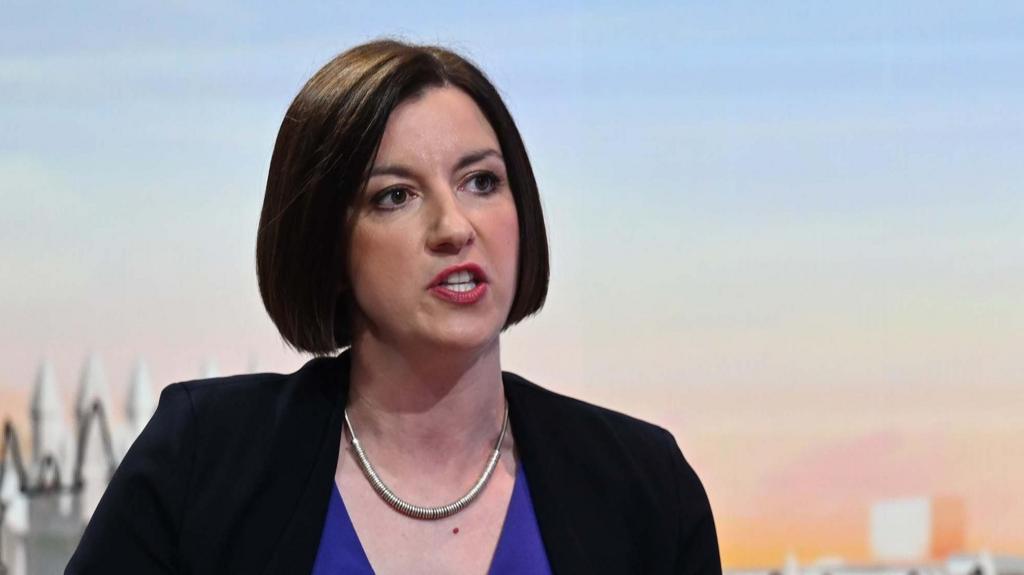Government reversals on welfare reforms have “hardened” spending decisions, according to the Education Secretary, who refrained from committing to the elimination of the two-child benefit cap.
Bridget Phillipson stated on BBC One’s Sunday With Laura Kuenssberg that ministers were “looking at every lever” to alleviate child poverty.
However, she cautioned that abolishing the cap would “come at a cost,” while emphasizing the government’s ongoing support for families facing cost of living pressures through alternative measures.
Her remarks follow a rebellion among Labour MPs, which significantly weakened a set of proposed welfare reforms intended to save £5 billion annually by 2030.
The scaling back of these reforms implies that anticipated savings will be either delayed or unrealized, thereby increasing pressure on Chancellor Rachel Reeves as she prepares for the autumn Budget.
Prior to the adjustments to welfare proposals, the Labour government had been weighing the possibility of lifting the two-child benefit cap, a policy that restricts means-tested benefits to a maximum of two children per family born after April 2017.
According to the Department for Work and Pensions, approximately 1.6 million children reside in households affected by the cap.
The Institute for Fiscal Studies (IFS) estimates that removing the policy would cost the government roughly £3.4 billion annually and would lift 500,000 children out of relative poverty.
When questioned by Kuenssberg on whether the likelihood of abolishing the cap had diminished, Phillipson responded, “The decisions that have been taken in the last week do make decisions, future decisions harder.”
“But all of that said, we will look at this collectively in terms of all of the ways that we can lift children out of poverty.”
Phillipson and Work and Pensions Secretary Liz Kendall are co-leading a child poverty taskforce, which is examining the potential for removing the cap, among other policy options.
The taskforce is anticipated to publish a strategy for reducing child poverty in the autumn.
The government established the taskforce last year amid calls from opposition parties and some Labour MPs to scrap the two-child benefit cap.
Considerable support for lifting the cap remains among many Labour backbenchers, particularly those who were prominent opponents of the planned welfare cuts.
In May, Phillipson stated that “nothing is off the table” when questioned about the government considering lifting the cap.
However, speaking to The Guardian on Friday, Chancellor Rachel Reeves stated that she was “not wedded to any specific policy” to reduce child poverty.
In that interview, Reeves said it would be “irresponsible” for a chancellor to rule out tax rises and said “there are costs to what happened” with welfare.
On the Sunday with Laura Kuenssberg programme, Phillipson struck a similar tone.
The cabinet minister said scrapping the two-child benefit cap “does come at a cost and that’s why, in keeping with our fiscal rules, we do need to make sure that we have a strong foundation for the economy”.
Phillipson said while the cap was “an important consideration”, it was “not the only way that we are supporting and will support families”, pointing to the expansion of family hubs, free school meals, breakfast clubs, and childcare.
In a post on X, Labour MP Jon Trickett – who voted against the government’s welfare changes – wrote: “The suggestion that Labour government will leave children in poverty because they couldn’t take welfare benefits from the disabled is truly shocking.”
Conservative shadow chancellor Mel Stride, who also appeared on the programme, said the government had made some “poor choices” and argued more could be done to cut the growing benefits bill.
He said his party would attempt to make changes to the government’s welfare reform bill as it makes its way through Parliament.
One of the party’s amendments would reduce entitlement to disability and health-related benefits for those with less severe mental conditions.
IFS analysis indicates that more than half of the rise in 16-64 year-olds claiming disability benefits since the Covid-19 pandemic is related to mental health or behavioural conditions.
If no changes are implemented, the health and disability benefits bill is projected to reach £70 billion annually by the end of the decade, a level of spending the government deems “unsustainable.”
The Conservatives have cited a report by the Centre for Social Justice, which asserted that cutting mental health benefits for all but the most severe cases would save £7.4 billion per year by 2030.
“We believe, particularly when it comes to mental health, one of the best solutions to those kinds of challenges is work,” Stride said.
“We are the party that believes in work. We don’t believe that welfare should trap people.”
The education secretary announces an extra £20bn for the schools building programme.
The education secretary says the policy pushes people into poverty but warns scrapping it would be costly.
Bridget Phillipson was responding to questions following the Supreme Court’s gender ruling.
Oxford Business College says it will legally challenge the government’s decision to remove its funding.
The education secretary says claims of student loan fraud point to one of the “biggest financial scandals” in the university sector.

